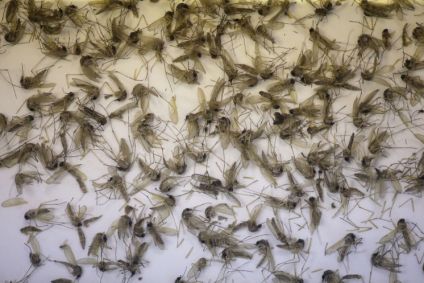UPDATED 7/21, 7/22 | The health threat of Zika in Florida intensified this week when the state Department of Health said a new investigation was underway into a possible second locally transmitted case involving the grim mosquito-borne illness.
A non-travel related case of Zika, caused by a local mosquito bite, would be the first in the continental United States, state and federal health officials said.

On Friday, state health officials said that "investigations into the possible non-travel related Zika virus cases in Miami-Dade and Broward counties are ongoing and the department will share more details as they become available."
The second suspected non-travel case of Zika involves a Broward County resident. The first, according to health officials, is a patient who lives in Miami-Dade County, which accounts for 93 of Florida’s 353 Zika cases. Broward was No. 2 with 51 cases and Orange has 36.
The health department website updates Florida's Zika statistics daily.
"Mosquitoes have been trapped in the area of investigation and are being tested," a health department spokeswoman said.
Roughly 200 people have been interviewed and tested as part of the investigations, health officials said. So far no captured mosquitoes were infected with Zika. Also Friday, Dr. Marc Fischer, an epidemiologist with the CDC, arrived in Florida to assist the state investigations with mapping and testing. The department is going door-to-door with mosquito control in the areas surrounding the residences, work places and frequently visited locations of both suspected cases.
All cases in Florida until Tuesday were classified as travel-related. The total includes 47 pregnant women who are considered at highest risk because of potential birth defects associated with Zika. Researchers say a prenatal Zika infection can cause microcephaly and other brain disorders.
Only one in five infected people, however, show symptoms, including joint pain, fever, rash and red eyes that can last more than a week.
The CDC, which was slow to acknowledge a sexual link with Zika, also said evidence emerged this week that the virus is spreading in unknown ways to scientists. A family member of a Utah man, who acquired Zika in a high-risk country, also was mysteriously infected.
“The new case in Utah is a surprise, showing that we still have more to learn about Zika," said Erin Staples, a CDC epidemiologist. “Fortunately, the patient recovered quickly, and from what we have seen with more than 1,300 travel-associated cases of Zika in the continental United States and Hawaii, non-sexual spread from one person to another does not appear to be common."
Florida and most of the Gulf region is familiar space for the Aedes aegypti and Aedes albopictus mosquitoes, the primary vectors for transmitting Zika. The disease, first identified in Uganda in 1947, can also be spread through blood transfusions and saliva. State and federal health authorities always feared that local mosquitoes could become carriers if they bit someone who was infected with Zika during travel abroad.
Florida Gov. Rick Scott initially declared a limited health emergency in February, when state health officials were reporting 20 cases of travel-related Zika. At the time, there were roughly 50 cases nationwide. Now there are more than 1,300 confirmed cases.
Zika, a health catastrophe in Brazil, spread for the first time to the Caribbean in June 2015 after a 12-year-old girl in the Dominican Republic was diagnosed. At the time, Zika was not on Florida's health department list of worrisome mosquito-borne illnesses.
Until recently neither was chikungunya, which spread locally in Florida for the first time in 2014. It was also the first case in the U.S. outside of Puerto Rico and the U.S. Virgin Islands.
Florida Health Investigating Possible Non-Travel Related Case of #Zika: https://t.co/yzgXQ92Amm
— Florida Dept. Health (@HealthyFla) July 20, 2016
Outside
Bitcoin mining emissions in China will hit 130 million tonnes by 2024 https://t.co/w6He7so8N2 pic.twitter.com/qYUDtBdeRK
— New Scientist (@newscientist) April 9, 2021
The Gunk Report
For the Blue-Green Algal Bloom Weekly Update from the Florida Department of Environmental Protection, tap here. For DEP's Algal Bloom Sampling Map, tap here.
What, me worry?
» "PLAYING WITH SHARKS," which recently premiered at the Sundance Film Festival, documents diving legend Valerie Taylor.